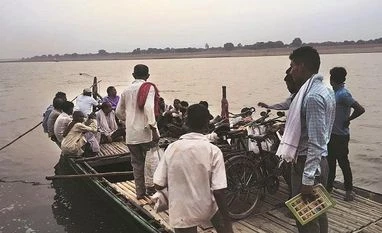Rekha Devi works under a blazing summer sun, carrying bushels of arhar, or pigeon pea, 2 km from the field to the farmer’s yard. “Every day that I’m able to find work, I can feed my three children,” says the 35-year-old landless farm labourer. The woman, a widow, is illiterate and has never voted. “If I’m lucky enough to find work on the polling day,” she says, “I won’t cast my vote this time, too.”
She is not alone. Beset by grinding poverty, unemployment and lack of opportunities, a significant percentage of the population in Mirzapur, one of India’s most backward districts, is too busy earning a living to take any interest in the ongoing Lok Sabha election.
Consider the 2014 Lok Sabha election statistics: Mirzapur recorded a voter turnout of 58.56 per cent (up from 52.18 per cent in 2009). It mirrored Uttar Pradesh’s average turnout of 58.6 per cent but was lower than the national average of 66.4 per cent. Of 2,079 polling stations here, 11 recorded a turnout of less than 30 per cent; the lowest was in Naugwa, where only 254 (24.6 per cent) of the 1,032 registered voters cast their vote.
Low turnouts at polls often indicate a level of disenchantment with the system. In Mirzapur, a microcosm of India’s politically significant Hindi belt, other factors seem to be in play.
Midsummer woes
For the 2014 election, district officials cite the scorching May heat as a deterrent to voters. “The 2014 election here was in the last phase in mid-May,” says Manoj Jaiswal, chairperson of Mirzapur’s Nagarpalika Parishad. “The heat deterred many voters, especially in Mirzapur city, from casting their vote.”
For rural voters, the region’s hilly terrain and lack of adequate public transport made the heat even harder to bear.
The constituency goes to the polls on May 19; many expect the weather to play spoilsport again.
Incorrect electoral rolls
Over the last few years, 35-year-old Archana Pathak, a graduate who lives in a joint family in Jiuti village, Mirzapur, has seen several members of her household migrate for better opportunities. Her husband’s younger brother, a truck driver, moved to Indore nearly 10 years ago with his wife. “Their names are still on the electoral rolls in our village,” she says. The story is the same in almost every household in the constituency, where migration for employment and education is de rigueur.
“I believe that the voter list has not been properly updated to reflect the reality of migration,” says Jaiswal, who won the civic election on a BJP ticket. “Many people who migrated years ago are still on the list and count as no-shows in the election.”
Gender divide
In the 2014 election, women constituted 45.45 per cent of Mirzapur’s voters. Many attribute this to the fact that traditionally, upper caste women in Mirzapur, and indeed, across the country’s Hindi belt, are discouraged from entering the public sphere. So whether they vote or not often depends on their family. Satakshi Upadhyaya, a postgraduate woman living in a middle-class joint family in Mirzapur city, points out that often women like her depend on their families to get their voter cards made. That is why many are not even registered as voters. Moreover, even educated women like her have little time and inclination for politics. “We’re so busy with our husbands and children that there’s no time to develop an interest in politics.”
Bringing back lost votes?
On January 25, 2017, Mirzapur set a Guinness world record for creating the largest rangoli. Its purpose? To drum up voter awareness and enthusiasm on the National Voters Day. Few in the city, let alone its far-flung rural areas, even heard about it. Whether it brought home even a single lost vote is hard to confirm. The administration this year, too, has come up with some unique ways to entice voters. They are planning motorcycle rallies, putting up posters and a Kalash Yatra in which 2,079 women carrying ritual vessels, representing each polling station, will walk through the town.
Political polarisation
In Jiuti village, a Brahmin stronghold, changes in voters’ behaviour can be seen. “Everyone is becoming conscious that their vote can help Modiji win,” says Pathak. Village elders decree who to vote for, and unwritten social sanctions await anyone who makes an independent choice. “Unlike us, lower caste members have always voted; this time our vote could ensure our community is better represented…” says she.
Meanwhile, at Mirzapur’s Teliaganj Labour Chowk, daily wagers Arif Ansari and Awadhnath Chamar return home without getting a day’s work. “We’re going to ensure that all voters in our communities vote,” they say in unison. “It’s a matter of survival this time!”
Unlock 30+ premium stories daily hand-picked by our editors, across devices on browser and app.
Pick your 5 favourite companies, get a daily email with all news updates on them.
Full access to our intuitive epaper - clip, save, share articles from any device; newspaper archives from 2006.
Preferential invites to Business Standard events.
Curated newsletters on markets, personal finance, policy & politics, start-ups, technology, and more.
)